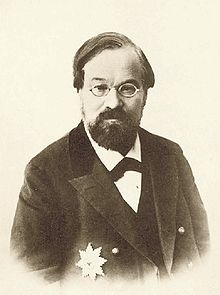Nikolai Bugaev
| Nikolai Bugaev | |
|---|---|
 |
|
| Born |
September 14, 1837 Georgia, Russian Empire |
| Died | June 11, 1903 (aged 65) Moscow, Russian Empire |
| Nationality | Russian |
| Fields | Mathematics |
| Institutions | Lomonosov University |
| Alma mater | Lomonosov University |
| Doctoral advisor |
Karl Weierstrass Ernst Kummer Joseph Liouville |
| Doctoral students |
Dmitri Egorov Leonid Lakhtin Nikolay Sonin |
Nikolai Vasilievich Bugaev (Russian: Никола́й Васи́льевич Буга́ев; September 14, 1837 – June 11, 1903) was a prominent Russian mathematician, the father of Andrei Bely.
Bugaev was born in Georgia, Russian Empire into a somewhat unstable family (his father was an army doctor), and at the age of ten young Nikolai was sent to Moscow to find his own means of obtaining an education. He succeeded, graduating in 1859 from Moscow University, where he majored in mathematics and physics. He went on to study engineering, but in 1863 wrote a Master's thesis on the convergence of infinite series. This document was sufficiently impressive to win him a place studying under Karl Weierstrass and Ernst Kummer in Berlin. He also spent some time in Paris studying under Joseph Liouville. He earned his doctoral degree in 1866 and returned to Moscow, where he taught for the remainder of his career. Some of his most influential papers offered proofs of previously unproven assertions of Liouville, but his most original work centered around the development of formal analogies between arithmetic and analytic operations.
Bugaev was the active member of the Moscow Mathematical Society and the president of it (1891-1903). He also wrote influential philosophical essays in which he trumpeted the virtues of mathematical analysis and decried the influence of geometry and probability. Many feel he is largely responsible for the pronounced predilection towards "hard analysis" which is characteristic of so much of the best Russian mathematics. Through Bugaev's star student, Dmitri Egorov, many famous Russian mathematicians, such as Andrei Kolmogorov and Nikolai Luzin, directly "descend" from Bugaev—and thus from the Prince of Mathematicians, Carl Friedrich Gauss.
...
Wikipedia
